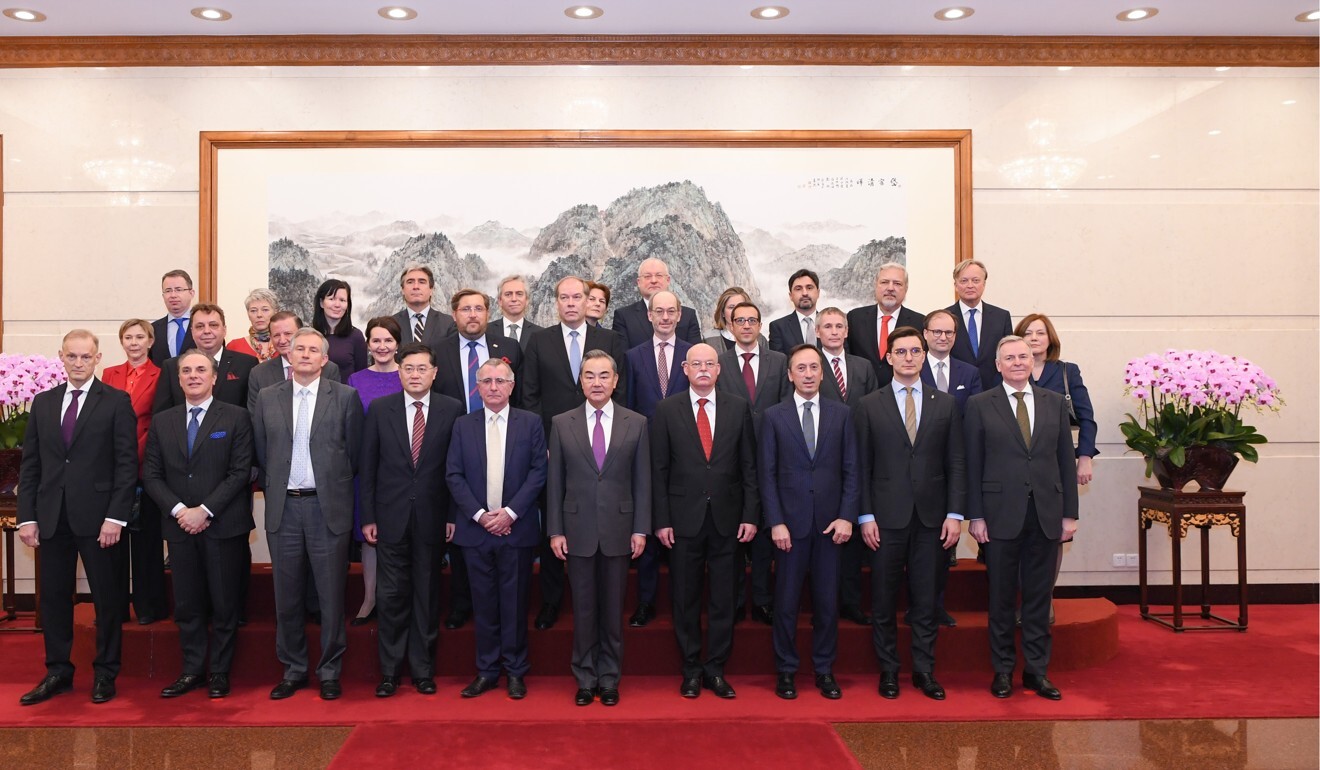
China-EU investment deal expected soon says Foreign Minister Wang Yi
- The diplomat was hopeful at a meeting with ambassadors from the 27 member countries of the European Union
- Wang is the first senior Chinese official to play up the prospect of a finalised deal after seven years of talks
But it seems the two sides are locked over one EU demand – that China should commit to ending forced labour in Xinjiang. Beijing denies the use of forced labour in the region, and says the measures rolled out are educational in nature and tackle terrorism.
“China and Europe are hopefully reaching consensus on the comprehensive investment agreement,” Wang told the ambassadors, according to a Chinese foreign ministry statement.
“It has once again been proved that China-EU cooperation is far greater than competition, and [areas of] consensus are far greater than differences. China and Europe are partners in mutually beneficial cooperation, and the relationship between the two sides is full of vitality,” he said.

A statement by the European Union delegation in China said its ambassador Nicolas Chapuis recalled the goal of finalising negotiations for the agreement by the end of 2020. He also noted progress in the ongoing talks, and that both sides were in continuous contact to address outstanding issues.
Diplomatic observers said a finalised Comprehensive Agreement on Investment (CAI) would give China’s relationship with the EU a much-needed boost in the face of troubled relations with Washington, but even that was unlikely to lead to a softening of Brussels’ stance on Beijing.
Jake Sullivan, national security adviser-designate for president-elect Joe Biden’s administration, said on Twitter that the Biden-Harris administration would welcome early consultations with Europe on “common concerns about China’s economic practices”.
The EU demanded that China make a commitment to end forced labour, a point repeatedly expressed by “many” of the 27 countries at a closed-door meeting in Brussels last week.
EU leader at UN calls out China on human rights and business practices
Beijing’s refusal to ratify International Labour Organization standards on forced labour would make it politically difficult for the European Parliament – whose endorsement is vital to validate the deal – to vote in its favour, according to EU officials.
A key member of the European Parliament weighed in on the EU-China deal, saying that its fate would depend on the issue of forced labour in Xinjiang.
“How the question of forced labour is addressed in the CAI will determine the agreement‘s fate,” Bernd Lange, chairman of the parliament’s trade committee, said on Twitter. The parliamentary committee would “judge the CAI based on the final text and we will take our time to do so,” he added.
Lange said the deal was developed “before the background of heightened concerns about forced labour in Xinjiang, the situation is clearly worrying”.
Chinese Foreign Ministry spokesman Wang Wenbin said in a daily press conference on Tuesday that China and the EU should fully utilise all opportunities to push cooperation, but added that there was no forced labour in Xinjiang.
“There is no such thing as forced labour in Xinjiang. Such claims are unfounded. They are slanders and smears against Xinjiang and China,” he said.
Zhou Yongsheng, an international relations professor at China Foreign Affairs University, said the issue could put a deal at risk, as the EU attached great importance to political and human rights.
China-EU decoupling not an option but Beijing must step up, German envoy says
Zhu Feng, director of the Institute of International Studies at Nanjing University, said there was a possibility the deal would not be signed, but added that the EU should not link Xinjiang to it.
The EU side had raised the issue of human rights, climate change and China’s response to the Covid-19 pandemic and the “implications of related restrictions on European businesses and citizens”, according to the statement. Concerns over restrictions on media freedoms and the free flow of information in China were also raised.
Coronavirus puts China’s ‘year of Europe’ on hold amid growing unease
“As two important forces in the process of multi-polarisation, China and Europe should work together to provide more stability to the world. The more complex the situation, the more objective and rational it is to maintain communication and dialogue,” Wang said.
Additional reporting by Stuart Lau and Jun Mai

